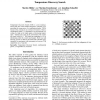533 search results - page 16 / 107 » Playing games with approximation algorithms |
COLT
2003
Springer
14 years 23 days ago
2003
Springer
A general class of no-regret learning algorithms, called no-Φ-regret learning algorithms, is defined which spans the spectrum from no-external-regret learning to no-internal-reg...
CAV
2007
Springer
14 years 1 months ago
2007
Springer
Three-color parity games capture the disjunction of a B¨uchi and a co-B¨uchi condition. The most efficient known algorithm for these games is the progress measures algorithm by ...
SPAA
2006
ACM
14 years 1 months ago
2006
ACM
Consider a network in which a collection of source nodes maintain and periodically update data objects for a collection of sink nodes, each of which periodically accesses the data...
TCIAIG
2010
13 years 2 months ago
2010
Abstract--Fingerprinting operators generate functional signatures of game players and are useful for their automated analysis independent of representation or encoding. The theory ...
AAAI
2004
13 years 9 months ago
2004
Temperature Discovery Search (TDS) is a new minimaxbased game tree search method designed to compute or approximate the temperature of a combinatorial game. TDS is based on the co...


